As the new editors of JORS, we feel greatly honoured to be given the opportunity to lead the journal into its seventh decade. Thanks to the excellent stewardship of our predecessors over the past 10 years, we are taking over responsibility for a journal that is in very good health. The Journal attracts a good flow of new papers that, while sometimes requiring reviewers and editors to make tough decisions, ultimately leads to the publication of many excellent papers. The Journal's impact factor is on an upward trajectory and, as the data in the tables below demonstrate, the Journal is truly international. Everyone associated with the Journal owes a large debt of gratitude to Terry Williams and John Wilson for the great job they have done. On a personal level we also thank Terry and John for their advice and support during the handover period.

No matter how well an organisation functions, people joining from outside can always find areas for refinement and improvement. It is in this context that we are making some small changes, which we believe will enhance the reputation of the Journal internationally and help to attract even more high quality submissions.
We intend to appoint further Associate Editors from the international operational research community. As well as helping to manage the high volume of submissions in a timely manner, these appointments would act as champions for the Journal raising awareness and encouraging new submissions in their regions. We are seeking Associate Editors in North America, mainland Europe and Asia. We also plan to review the operation of the International Advisory Board with the aim of increasing the opportunities for members of the Board to contribute to the Journal.
The time taken to provide feedback on submitted manuscripts is a key element of the service a journal provides its authors. The new online manuscript handling system supplied by eJournalPress (EJP) should lead to a substantial reduction in the time required to respond to submissions to JORS. Our ambitious aim is to provide an initial decision on all new submissions to the Journal within 90 days. In the first year of operating the EJP system, this has certainly not been achieved. Much time has been spent learning how to use the system and adapting the system for the way in which we want to work. In the coming year, we will strive to increase the frequency with which we meet this target.
We aim to further improve the quality of service provided to authors by reducing the time between acceptance of a paper and its publication in the Journal. Despite increases in the number of pages per volume, the backlog of accepted papers awaiting publication remains relatively high. Our aim is to reduce the time a paper spends on Advanced Online Publication (AOP) to around six months. We believe this can be achieved, and sustained, through higher selectivity, tight control of the length of submissions and, in the short term, slightly larger issues.
In time, we intend to do away with the current classification of papers as case studies, theoretical papers and technical notes. The classification is often far from clear cut and can lead to misconceptions about the purpose of articles. Do theoretical papers have no practical relevance? Are technical notes less important? Do case studies lack both theoretical and technical content? We believe that the criteria for publication are essentially the same for all types of manuscript. In brief these criteria are: relevance, impact, originality, rigour and clarity. Therefore, this change is intended to emphasise that all papers published in the Journal should have a strong practical focus. In common with past editors, we encourage the submission of case-oriented papers that provide thoughtful reflection on any aspect of the application of OR methodologies.
After a relatively short time in the job, we already appreciate the large number of people who contribute in many different ways to help make the Journal a success. We thank our Editorial Assistant, Sarah Parry, who liaises with authors and reviewers and has been on the frontline with respect to enquiries about the EJP system. We thank the staff at our publisher, Palgrave, particularly Ros Pyne and Guy Edwards who have been very patient in dealing with our many requests for changes to the configuration of the EJP system. We are very grateful for the support of our Associate Editors, Graham Kendall and Mike Pidd, our Viewpoint Editor, Aris Syntetos, and our Book Editor, Jim Chilcott. Finally, we thank the most important people, without whom the Journal would not exist, the authors, the reviewers and the readers.